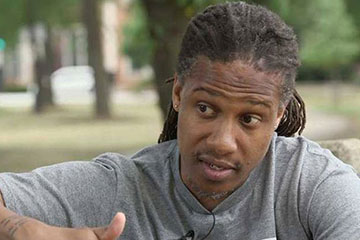
03/06/2018
David Stovall, whose initiatives to improve urban education within economically disadvantaged areas has led him to speak out against these injustices to colleges nationwide, will speak on Wednesday, March 7, at SUNY Cortland.
A professor at the University of Illinois in Chicago, where he teaches educational policy and African-American studies, Stovall will discuss “Are We Ready for the Abolition of ‘School’? Lessons on Community Engaged Struggle for Quality Education,” at 7 p.m. in Sperry Center, Room 204.
His talk continues the College’s year-long “Incllusion” series of lectures, films and common readings planned by SUNY Cortland’s Cultural and Intellectual Climate Committee (CICC) for the 2017-18 academic year.
This year’s series explores the concept that inclusion necessitates the recognition of “The Other,” that is those who are not “like us,” against whom we form our identity and over whom we seek to maintain power or distance. It requires that we think deeply and act inclusively with regard to who “counts” as a human being and who belongs in “our” community. The series, which has at its heart the philosophy of highly acclaimed, provocative New York Times bestseller Chimamanda Ngozi Adichie, will focus on inclusion as a fundamental condition for equity and human rights.
All “Incllusion” events are free and open to the public.
A Chicago native, Stovall graduated from Luther High School South in 1990. He completed his undergraduate degree and Ph.D. at the University of Illinois at Urbana-Champaign.
Stovall has spent the last 10 years of his career working with different community organizations and schools to create a broader curriculum that goes beyond reading, writing and arithmetic, in order to further advocate for issues of social justice.
“In terms of the campus talk, I’ve been working on this concept of ‘school’ abolition,” Stovall said. “‘School,’ in this sense, is the system of order and compliance that get us further away from education ¾ the ability to ask questions of our conditions while working to change them.”
His family and community organizations encouraged him to pursue educational work on racial injustice, which became Stovall’s initial motivation for entering such a controversial and complex field, according to his online profile.
Due to the success of his community work, Stovall became a member of the Social Justice High School design team, which ultimately led to his additional work as a volunteer social studies teacher at the Greater Lawndale/Little Village School.
The four major areas that Stovall often addresses and stresses to his audiences are: critical race theory, concepts of social justice in education, the relationship between housing and education and the relationship between schools and community stakeholders.
Along with working as a full-time college professor, volunteer high school teacher and motivational public speaker, Stovall has reached out to college professors in California, Arizona and New York to teach his mission in their high school courses.
“I’ve been working with this group for eight years,” Stovall said. “The idea is to provide historically underserved schools with college access through their interactions with us. We’ve been enrolling the students that take classes with us in our respective universities to get early college credit.”
By using a different intellectual theme each year, the CICC committee aims to generate common topics of discussion and to establish traditions of intellectual discourse on SUNY Cortland’s campus. The series encourages faculty and staff to infuse the theme into their course curricula, engage in classroom discussions and debates around the theme, and propose campus events or speakers on related topics.
For more information on CICC events this semester, visit the CICC website or contact CICC co-chairs Brian Barrett at 607-753-2330 or Jena Curtis at 607-753-2979.
Prepared by Communications Office writing intern Hannah Bistocchi